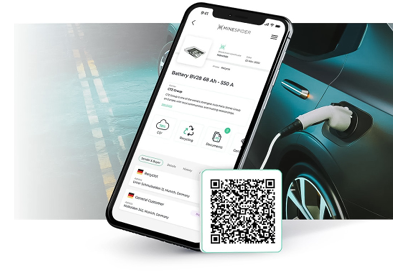This article first appeared on Reverse Logistics Association (https://rla.org). Read the original copy. Visit Com2 Recycling Solutions
By Lauren Roman, TransparentPlanet for Com2 Recycling Solutions
In the dynamic landscape of supply chain management, the convergence of reverse logistics and digital product passports is reshaping how businesses approach product lifecycle management. Here we will explore the synergies between these two innovative concepts, their collective impacts and how one company in the reverse logistics supply chain is evolving in preparation for meeting the future demand.
The Rise of Digital Product Passports
Digital Product Passports, or DPPs, represent a paradigm shift in how we trace and manage products throughout their lifecycles. Simply explained, DPPs involve machine readable (think cell phone and other ‘scanners’) tag or mark on a product, such as a QR code. That tag is linked to all kinds of information about that product. Anyone encountering the product, whether it be a consumer, a transporter or a repair, refurbishment or recycling employee, can scan the tag and get a wealth of information about the product. This can include information about what went into the product, where that material came from, where it was manufactured, whether the supply chain complies with human rights and environmental regulations and information supporting efficient repair, refurbishment and recycling and more. The purpose is to end the usual take-make-dispose product model and replace it with a circular economy, where products are designed, manufactured and managed for extended use and responsible recycling, conserving resources, reducing the product’s CO2 footprint and avoiding disposal to the largest degree possible.
Europe is leading the DPP and product circular economy charge, with the Battery Passport being a cornerstone of the forthcoming implementation of the Battery Regulation. Lithium ion batteries for vehicles, renewable energy storage and much more are the foundation for a clean energy future for Europe. Ensuring that the critical minerals that go into these batteries are sustainably sourced, used as long as possible and then recovered for reuse over and over again is essential for a robust battery industry in Europe and in countries throughout the world. Rechargeable batteries are now heavily relied upon for achievement of global CO2 reduction goals.
Europe’s next targets for circular product management will require DPPs for consumer electronics and textiles with much more to come.
The US and other countries are keeping a close eye on these developments in Europe and working with members of the European Commission on product traceability standards and much more. DPPs for these products and others are likely to be coming soon to a country near you. They are a gift to the environment and a gift to stakeholders in the reverse logistics supply chain, leveraging regulations and other incentives to advance circular management of products.
Reverse Logistics & Digital Product Passports
Digital product passports complement and enhance reverse logistics processes. Having a comprehensive digital record facilitates the efficient handling of returns, repairs and recalls by providing crucial information on a product’s history, warranty status, and refurbishment/reuse/recycling potential.
The integration of DPPs in reverse logistics plays a crucial role in reducing waste, conserving resources and fostering more sustainable products through several key mechanisms:
- Efficient Returns and Repairs – Information about product history including manufacturing details, usage and maintenance records (which can be uploaded to the DPP by authorized users). This information enables quicker and more accurate assessments during the returns process.
- Optimized Refurbishment – With insights to a product’s condition, DPPS support informed decisions on refurbishment opportunities.
- Responsible End-of-Life Management – Information on materials used in manufacturing, efficient disassembly techniques and recyclability allows for efficient disassembly and recycling processes.
- Supply Chain Transparency – Increasingly, manufacturers (read: customers of reverse logistics suppliers) are required to certify the sustainability of their supply chain. The US Investment Recovery Act requires that manufactures of electric vehicle batteries certify the sources of battery critical minerals, requiring high percentages of these to be sourced in the US or with US trading partners. Without this evidence, consumers of electric vehicles are not eligible for the maximum $7500 credit available for electric vehicle batteries that meet this requirement.
- Traceability for Compliance – Depending upon regulatory requirements and the type of technology used, DPPs can support product traceability. If a digital record of a product’s journey is collected, business can evidence regulatory compliance, avoiding legal issues and reputational damage.
- Reduction in Counterfeiting – DPPs, which can be supported by blockchain technology, can mitigate the risks of counterfeiting. Products can be authenticated through a secure and immutable digital record, ensuring that genuine products are properly managed through reverse logistics. This reduces the circulation of counterfeit goods, which often lack the quality and sustainability features of legitimate products and violate regulations.
Reverse Logistics Stakeholders Evolve
Reverse logistics finds its roots in the customer service policy of Montgomery Ward, an American furniture shop established in 1872. Their policy was that if the customer is not 100% satisfied, they could bring their purchase back for a full refund1
Electronics recyclers and refurbishers have been key players electronics reverse logistics for decades. One industry powerhouse, COM2 Recycling Solutions headquartered in Carol Stream, IL, started providing reverse logistics, refurbishment and recycling of electronics in 2001. Like so many e-recyclers at the time, they evolved from electronics repair and refurbishment to recycling as the unusable parts began to accumulate. Now the company operates 3 facilities in the US and Canada encompassing approximately 300,000 square feet for refurbishing and recycling electronics.
A tribute to COM2’s progressive business strategy was the kickoff of their new technology for transforming CRT glass into a raw material to product glaze for ceramic tile in 2017. As glass to glass (i.e. circular economy for CRT glass) markets dried up, COM2 explored other uses for ground CRT glass and found a perfect fit in the tile industry. They partnered with ceramic tile manufacturers throughout Brazil to establish a beneficial reuse for this glass which was then largely being stockpiled and illegally disposed of across the US. They were the first to cross a potential barrier with the US EPA which in their interest declared that the CRT glass to frit process was, in fact, beneficial use2 and that once rendered into a raw material for another product exports of the product were not considered waste exports.
With DPPs on the horizon, COM2 has continued to evolve and is currently adding capabilities for recycling and logistics of solar panels, which are also a likely target for DPP requirements. Plans thereafter include services for managing electric vehicle and other large format batteries.
With the growth of Digital Product Passports, opportunities for stakeholders in the reverse logistics supply chain are now unprecedented. We have arrived at a time when sustainability and product circular economy are essential for the life of our planet. The integration of reverse logistics and digital product passports emerges as a powerful strategy for meeting client demands for sustainability, embracing the digital transformation and for business in the reverse logistics supply chain to evolve to meet the growing demands.
To learn more about DPPs in Europe, resources are available at https://psqr.eu/. For the case for DPPs in the US, visit https://kezzler.com/blog/why-the-us-is-ready-for-a-digital-product-passport/. COM2 can be reached at info@com2recycling.com or 877-977-COM2
1 Robinson, A. (2014, March 1). History of Reverse Logistics is at the Core of The Stories of War, Retail, eCommerce, and Automotive Aftermarket. Retrieved November 29, 2023, from https://rla.org/media/article/view?id=492
2 US EPA (n.d.). Beneficial Reuse of Materials. EPA Archive. Retrieved December 1, 2023, from chrome-extension://efaidnbmnnnibpcajpcglclefindmkaj/https://archive.epa.gov/sectors/web/pdf/beneficialreusebw.pdf
 Lauren Roman
Lauren Roman
COM2 Recycling Solutions greatly appreciate Lauren Roman of TransparentPlanet for working together with us to create an informative article about the Digital Product Passport (DDP). The valuable insights and expertise shared during our collaboration have been extremely beneficial to us. This fruitful partnership has equipped us with invaluable knowledge about the DDP that we are now prepared to share.

